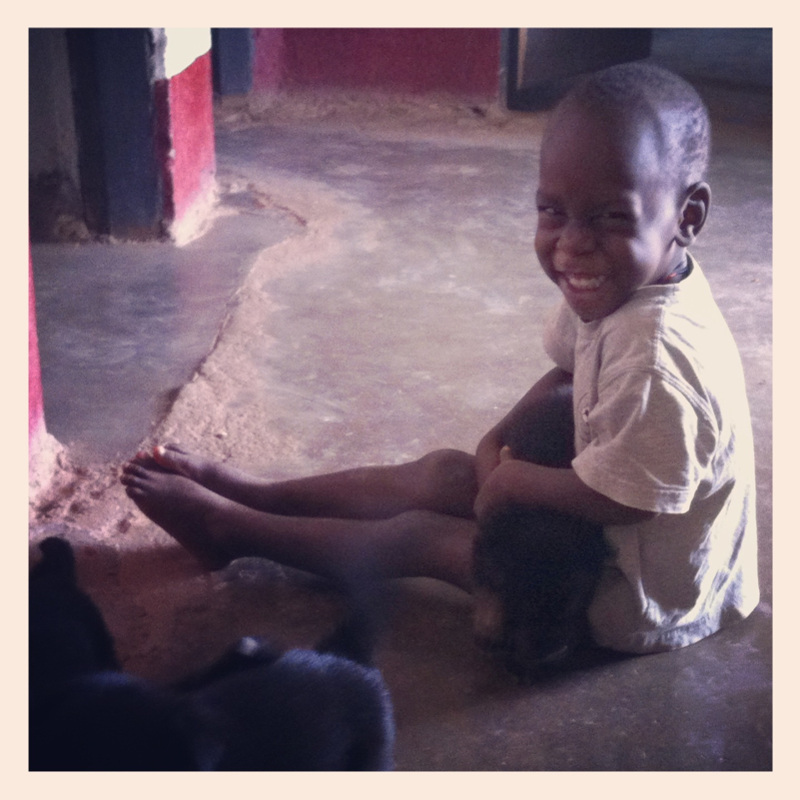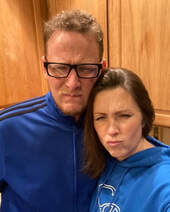|
It's two days after Christmas when I get the call. The old bull elephant I'd been watching lumbers slowly off as our jeep creeps past. I can hear my kids laughing and talking above me, their feet hanging just in reach of a good tickle, but I don't feel like tickling anymore.
“She's gone,” my mom says quietly. The call I had been expecting. Maybe not here on the other side of the world, a game drive in progress, but no one can say the day or the hour when we are called home.
He looks over at me in concern as I listen to the details, my grip tightening on the wheel. He's wondering when I'm going to break down. And I want to, I do, but some things hurt too much for tears. No matter how much you prepare it still hits you like a punch in the gut, as if you never saw it coming. I'll never understand it. I'd planned to go home, I want to go, but I'm 16 hours from the airport, and my passport is tied up at immigration. There's just no way. My eyes follow the old bull, his tusks yellowed with age. He seems so lonely.
I think of my grandmother the last time I saw her. Stooped, a bit frail, but still spunky as ever. Over the last few years her world had shrunk to the four walls of her home. She didn't feel like going out and had few visitors. It turns out she was struggling the whole time with fierce pain while breathing with only one lung.
The things that go unsaid.
She always was a tough woman, following my grandfather literally to the ends of the earth. Ethiopia for a stint, Oregon for a longer one, both far from her Southern roots. But the draw of home would eventually bring them back to raise their children where the pecan trees grow thick and heavy laden. In my childish memories her house was always a place of mystery and adventure. Woods and fields, worn paths and hidden animals, coke can shooting and pecan tree climbing. The rooms were full of hidden nooks and crannies, bookshelves overflowing with outdated and fraying paperbacks. It smelled of must and damp, a house well-lived in if not well-cared for. I loved every minute of every day I spent there.
But most of all I loved being with her. As the years passed I continued to visit her, alone this time. She sold the old place after my grandfather became too frail, both in body and mind, to keep it up and moved in with my aunt and uncle. I would spend weekends with her as often as I could get away from college activities and growing relationships. She would take me shopping at the mall for things she thought I needed, finishing our trips with the cafeteria line at Picadilly. Those years were marked by cafeteria lines. Afterwards I would ask if I could drive her, and now and then she would let me. Mostly she stubbornly refused, a sign of character traits someday to come in my own children.
When those days finally came she was still there, tucking a check into my pocket every time we visited her. For travel expenses or for the children she would say. And I would kiss her soft, wrinkled cheek and bend down to hug her bent body, hoping she could feel my love in the core of her being. Because I loved her, love her, so much.
Yet she'd been lonely for so long. We buried her husband, my grandfather, in 1999, my dad in 2005, then my aunt, her only daughter, in 2006. I remember our breakfast together before my aunt's funeral service, her untouched food and tired, grief-filled eyes.
“A mother should never outlive her children,” she would tell me, and my heart ached with our shared loss.
But she was right, and since then she's just been waiting for her turn.
The jeep rocks back and forth as we bump along the rutted path, tall grass waving on each side. I look again for the old bull, but he's plodded away, now only a grey speck fading into the hazy savannah. Maybe it's his turn as well, and maybe what I've seen as loneliness is just that pause before death, the letting go of this life and turning to the next.
I hope she knows, I hope she has always known, the things I left unsaid. Not I love you, that I said often, but I want to be like you andYou taught me how to truly love. I hope she knows how proud I am of her.
A breeze stirs, filling the jeep with the scent of dried grass and warm earth. Bird songs echo across the swaying fields as they dip and glide with the rushing wind. I breathe in the life around me and slowly my grip on the wheel relaxes.
2 Comments
We lay in the hammock together tonight, his head resting on my arm, his little legs wrapped around mine, and looked at the moon. Between pointing at stars and trees and glimpses of moonlight he would hug my growing belly, absently rubbing it as he does every day. He turned three a few days ago, my seventh child, and we celebrated his miracle-of-a-life with cake and candles and many, many heartfelt gifts, one of the perks of large families and generous kids. He was thrilled that it was finally his turn to be celebrated, not knowing the celebration I feel each day of his life. We visited his first family recently. The whole village came out to see him, and he greeted them one by one, at once both friendly and oblivious. He chased chickens and drank soda and everywhere we went the people were amazed by him. I found an old journal this week from my first days of caring for him. I seemed tired and worn out, nursing two babies and getting little sleep, but oh, so in love with this boy. Even then, from day one, my heart was crying for this baby that no one wanted the responsibility for, this tiny one so alive, even at 2 1/2 pounds. I had coffee with a friend the last time I was in Jinja, and we talked about the prevalence of abandoned babies in Uganda. Her girls used to spend time on the street before joining her family and pick through garbage for their living. Abandoned babies were a common sight for them. They would find babies in dumpsters or among the trash, alive and crying. But they were children themselves, barely making it, unable to care for another, and this was just normal life. Babies unwanted, unloved, unclaimed. In Kaceri we have a program called the Moses Project that was born out of a desire to see babies, from all situations, thriving in their families. Today we met in our school hut, seven mothers and grandmothers with their twins and grandchildren, babies crawling and crying everywhere. We read the Bible together, we prayed for each other, we gave out milk and food, we held little ones and gave instruction about caring well for their children. We tried, with our words and actions, to validate these women who are trying so hard against such difficult odds. And it's working. They are learning and babies are thriving. As I sat there with these women, Acuka on my lap, I was overwhelmed with gratitude for my son's life. He was one of these children, a motherless child, unwanted by his grandmother, supposed too small to survive. But now. Now. He is our joy. It just radiates from him. He jumps everywhere he goes, and his laughter is constant and contagious. He copies everything his brothers and sisters do, for better or for worse. He almost always has a toy car clutched in one fist, but can rarely be found in pants. He is spontaneous and free with his affection and loves everything except napping and bathing. He still makes me stop and stare with wonder at his life, his miracle-of-a-life. And so tonight I cuddle him close. I kiss his fuzzy head and stroke his brown cheeks. We look at the moon together as the hammock sways, and I give thanks for his life and the chance to be a part of it. What a blessing he is. (Don't worry, I WILL be posting an update about distribution to the fire victims. Unfortunately my internet is not good enough to load many pictures here, so I will wait until the next time I am in Kotido.) |
Would you consider partnering with us financially to serve Liberia?Kenneth and Kristi Williams The Williams Family
Kenneth and Kristi
Nevaeh, 20 years old
Rikot and Sadat,
our newlyweds Ezra, 19 years old
Zion, 18 years old
Izzy, 16 years old
Selah, 13 years old
Acuka, 13 years old
Benaiah, 10 years old
Jubal, 7 years old
Jireh, 3 years old
Blog archives
July 2024
Categories |












